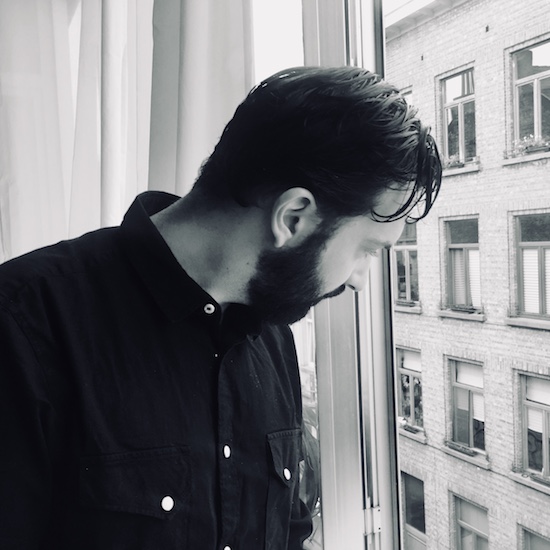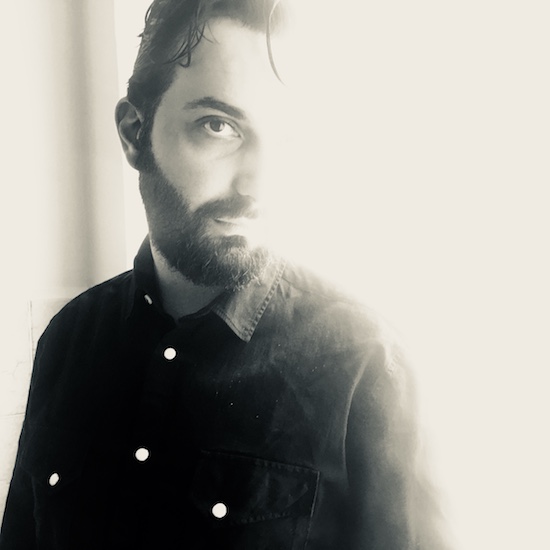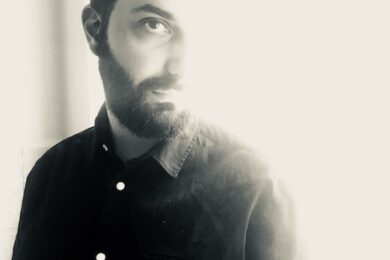December is the moniker of Paris-based producer Tomas More, under which he produces music that’s minimalistic, melancholic, raw and abrasive. His debut, In Advance Of The Broken Arm, appeared on Blackest Ever Black in 2014, signalling his penchant for slow, shadowy music-making. "A repetitive, naïve and dark approach to club music”, as he called it. Repetitive it may be, but it’s definitely not purely functional.
His productions are loaded with an equal dose of angst and anger. More is not nostalgic about the music he makes: he produces largely on software, and his tracks are far from a sentimental nod to the golden era of EBM/industrial, though he understands the reasons why dark electronics has gained popularity in recent years.
“We live in an extremely violent system that tries to keep a smiley and liberal face. Dark and brutal Art is the most logical reaction to it.” Following a string of releases on imprints like Where To Now?, In Paradisum, Mannequin, Jealous God and Helena Hauff’s Return To Disorder, More’s latest EP, titled Night Of Nights, is out now via Pinkman.
First, a prosaic question: Why is your moniker December?
Tomas More: I’m usually quite suspicious and a little bit cynical about the way artists use marketed storytelling about their aliases. I often wonder if their answers are not exaggerated or “well-oiled” for interviews. I sometimes like not to know the explanation or the story behind a producer’s alias and just let my imagination roll. But I suppose now that you’ve asked I have to disappoint the ones that could have told themselves a better story than the one I’m going to tell now, ha ha ha! I actually had another music project before, with another moniker. I got bored of what was going on around me at that time and started not to feel in my place anymore.
I decided to stop making music for a while. For a year or so, I just messed around in my little home studio and tried different things, reconnecting with what I really wanted to do, digging into my obsessions and trying to find a more personal approach of production and mixing genres. It took a while and it was a little confusing, sometimes scary, but I have to say that I mostly have good memories of that time. I enjoyed being a little lost and the feeling of starting everything all over, from scratch. Pretty much like moving to a new city. Anyway, it lasted for a year or so and I finally felt that I got something. I finished a track that felt good and personal. It was the first day of December.
Following releases on Jealous God and Return To Disorder, you have a new EP out on Pinkman where you’re using your voice more. You mentioned being inspired by Meredith Monk. Can you talk about the creative development of your work, and the use of your voice as such?
TM: My first releases were pretty dry, minimalistic, almost ascetic, I’d say. Simple, at least. And I think it was a necessary step to rebuild my sound. Focusing on fewer elements and finding the core, like the skeleton, of what would be my music. But I slowly got more confident and wanted to try out new stuff, make my tracks thicker and slightly more complex, build my style slowly. And the first thing that instantly came to my mind was using a microphone. I willingly say “using a microphone” and not “singing” because I don’t consider what I do as proper singing.
I like the sound of voices: from spoken word to screaming, making random noises or breathing. I’ve always been fascinated by minimalistic and “un-musical” ways of using human voice in music. My parents listened to Meredith Monk records when I was a kid and it really struck me. It was so primal and pure, like listening to what was before music, to the core of musical emotions. Pure and way more powerful than anything I could have listened to before. It has stuck with me. Letting go of this “message” trap of lyrics; even though Meredith Monk’s music definitely has some message, and even stronger one than words. But finding one that is deeper than a purely intellectual construction of words, just a pure meaning, unperverted. This is why I never write or even “sing” any real sentences, just raw words, improvised. I’m careful with real “lyrics” and their meanings. I want to reach something deeper, almost unconscious.
Can you talk about some of the inspirations behind the project?
TM: My main inspirations have always pretty much stayed the same. A minimalistic, melancholic, repetitive, naïve and dark approach to club music. Films have also always been very decisive. I studied cinema and I work on a film festival for a part of the year. Images have been as present as sounds in my aesthetic approach to music. Visceral and radical ways of filmmaking have always fascinated me. Bresson, Costa, Akerman or Weerasethakul have always influenced me, in different ways. Their stripped-down approach and obsession for what we cannot see had a huge impact on me.
The emo/cold/dark imagery is a key element of what I do, too. I like these simple and naïve feelings they celebrate: tragedy, melancholy, mystery. I don’t know why I’ve always reacted way stronger to dark and cold atmospheres than shiny and positive ones.
Another influence you mention is Smersh, the post-punk/industrial outfit that operated in a very particular way. They improvised and recorded every Monday night, and released the music on their own label. They never played live or played the same track more than once.
TM: Yes. And this is important to me, too. I’m afraid of the cold perfection of “well-made” music. I like mistakes, accidents, off-sounding noises, dissonant melodies. I record most of my tracks spontaneously, some of them are even coming from live performances (like ’64 Ways To Rob A Friend’ from last year’s EP on Return To Disorder or ‘Sociability Is As Much A Law Of Nature’ and ‘Night Of Nights’ from my last record released a few weeks ago on Pinkman). I like that urge, that rough feeling of music that wasn’t too “well thought out” but came from deep inside, from something more essential than smart concepts and well constructed strategies and fantasies. Smersh’s music fascinates me for the same reason Meredith Monk’s does, in a way. I’m careful with theories and plans. I’m interested in the darker side of music, its uncontrolled, untamed nature.

One of the tracks on the new EP is called ‘Sociability Is As Much A Law Of Nature As Mutual Struggle’. Can you talk about this title?
TM: Those who know me personally are aware of my political opinions and this sentence is a quote from anarchist pioneer Peter Kropotkin. It’s a statement against Hobbes’s perspective on the law of nature ruling human condition. Hobbes is convinced that the state of nature of human beings is a state of war. Kropotkin has this essential idea that we are not only wolves amongst wolves but also social animals driven by a will to help each other and exchange as much as the urge to fight. This is very important to me as I can’t stand the way capitalism constantly relates to the so-called ‘violent nature of human condition’ to maintain itself. Supposedly protecting us from the worst, from our inner desire to struggle. It constantly refers to itself as the antidote to chaos, maintaining order against humanity’s obsession for war. I believe this is a philosophical fiction helping unfair and violent societies to maintain themselves, limiting people’s desire for more justice and equality. I really like the radical but optimistic – idealistic – approach of anarchism. We live in a society forcing us to mistake realism for status quo, forgiving the unforgivable, giving up our deep desire for a better life. It’s a very important balance for me: being radical in the way we criticise what’s around us but optimistic in believing that a better situation is always possible. Fighting is not useless, pretty much the opposite, actually.
Taking the above into consideration – and since you live in Paris – how do you reflect on the gilets jaunes movement and calls for greater social and economic justice. Have the underground music and art scenes somehow reflected this movement locally?
TM: I’m actually pretty shocked by the silence of musicians and more generally artists about that social movement. I sometimes have the feeling that political statements are easier to make and more frequent when they target distant realities and far away countries in the world of virtual/social networks – than fighting local fights, especially movements against economic inequality. This movement is complex and must be analysed and understood with care but it is a fascinating and incredibly strong episode in France’s political history. We haven’t had such a unique and powerful social movement here for decades. Even though people abroad think that French people make revolutions every day, it is actually not the case: there are less and less mass strikes and powerful social resistance in France today and the gilets jaunes protests are very interesting and solid.
There’s nothing new here: more equality and a better distribution of wealth are being asked but I think that this is the most subversive motto a political protest can have. It’s the core of capitalism and its violence, what enables it to keep going on and expanding its strength and plasticity. This movement is comparable to the 1870s La Commune de Paris, our 1789 national revolution, May ’68 or any worker’s social protests, but it’s still the most effective way to say no to the society we live in. And I think artists must support them as they suffer exactly from the same things than all these women and men walking down Parisian streets every Saturday.
December is an alumnus of the SHAPE platformSHAPE platform for music and audiovisual art.



